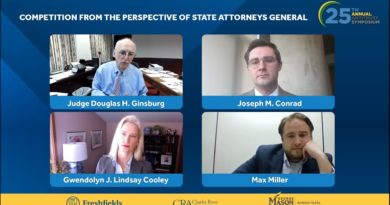The Awarding of Bundesliga Media Rights for the Seasons of 2025/26 to 2028/29
Tension is mounting among TV broadcasters and streaming providers as the German Bundeskartellamt (Federal Cartel Office – FCO) approved the plans to award the media rights on February 26, 2024 and the DFL’s tendering process will begin shortly. However, the FCO has still not decided the associated antitrust issues, which have been hovering over the media rights tenders of the professional leagues in the European Union for over 20 years, in particular the question of the award of exclusive broadcasting rights, for the benefit of functioning competition.
The FCO Notification of 26 February 2024 pursuant to Sections 32c (2), 61 (2) ARC
The FCO recently approved the marketing model submitted by the DFL for the allocation of media rights to Bundesliga matches from the 2025/26 to 2028/29 seasons. In its assessment, the FCO focused on the free-to-air highlight coverage, which ensures that football fans who do not want to or cannot pay for live broadcasts can still follow the league action, thus ensuring that all public groups have access to TV coverage of the Bundesliga. As expected, the no-single-buyer rule for pay-TV live broadcasting rights was abolished, meaning that in theory the complete live rights to all Bundesliga matches could be acquired by one provider. However, the rights will continue to be awarded in packages for all broadcasting channels, i.e. satellite, cable and internet, and will be exclusive in each case. The allocation of rights is divided into a.) Saturday afternoon conference, b.) individual matches on Saturday afternoon and Friday, c.) top match on Saturday evening and d.) individual matches on Sunday, according to the FCO press release.
Analysis under Antitrust Law
Restriction of Competition via Exclusivity
The exclusive selling of Bundesliga media rights by the DFL constitutes a restriction of competition within the meaning of Sec. 1 ARC, Art. 101 TFEU and the abuse of a dominant market position pursuant to Section 19 (2) No. 4 ARC, Art. 102 TFEU, as it creates monopolies on the part of the media providers and forecloses the audience markets. In the past, the FCO has always found it difficult to assess the issue of centralized marketing, as the FCO has not yet been prepared to conclusively define the broadcasting rights marketed, not only in terms of their content, but also in terms of the respective rights holders. Demand from media providers is generally derived primarily from viewer preferences, although it is now probably recognized under competition law that individual soccer matches are not readily substitutable from a viewer perspective. In addition, there is a tiered competitive relationship between the marketed rights, particularly with regard to live broadcasts and highlight coverage. There are also interactions between the competitive situation at national level and international markets as well as between commercial and sporting competition. Due to these complex issues, the German Monopolies Commission (Monopolkommission), the established independent public counselling body on competition policy in Germany, already recommended in its 21st biennial report pursuant to Section 44 ARC in 2016 that the practice of only conducting preliminary assessments with commitments should not be continued, but that the procedure should be concluded with a well-founded decision based on comprehensive investigations. The Monopolies Commission suggested that, as part of the procedure in which only clubs and media providers are directly involved, viewer preferences in particular should be determined more precisely, e.g. through surveys .
The Implications of the Recent ECJ Jurisprudence
In its “Super League” ruling of 21 December 2023, the ECJ also explicitly stated that UEFA and FIFA’s centralized selling must be assessed as a “restriction of competition by object”, i.e. as a regulation which, by its very nature or by its mere essence, can be regarded as likely to have a negative impact on, in particular, the price, quantity or quality of goods or services. (see on the Super League case and other sports rulings of the ECJ previous blog posts here and here).
In its judgment, the ECJ further considered that only the redistribution of funds generated from central selling can be considered as an efficiency advantage eligible for justification under Article 101(3) TFEU (see judgment in the “Super League” case, para. 232 et seq). Although reference is made to the ECJ ruling, the FCO comes to the interim conclusion that the presented commercialization model of the DFL, including the allocation of exclusive live packages for Bundesliga matches (packages A to D), can currently still (German: „derzeit noch“) be tolerated. The notification pursuant to Sections 32c (2) and 61 (2) ARC reads as follows: “After a very preliminary assessment, the decision-making division sees a possibility of consideration as an advantage of centralized marketing, in particular with regard to the equal distribution of proceeds between the clubs and the distribution of proceeds linked to their youth development work. In its judgment in the “Super League” case, the European Court of Justice refers to the fact that the proper functioning of a competition depends on the establishment of a competitive balance and equal opportunities between the participating clubs (para. 235), as well as to the importance of promoting youth development in soccer (para. 236).” (see the German full text here). In my opinion, these statements do not lack a sense of humour, because these are exactly the points that have been criticized by many academics and fans for years. There is no “equal distribution” of media revenue in the Bundesliga and the distribution keys that are used favour the larger and more successful Bundesliga clubs, which constantly widens the revenue gap. Moreover, the funds for the promotion of youth development are negligible when looking at the total revenues.
Conclusion
The complementary but still exclusive granting of rights to TV broadcasters and streaming services is detrimental to competition because Bundesliga matches, which from the fans’ point of view are event-related spectator markets, are not substitutable offers and thus simply create further monopolies at the level of broadcasters and streaming providers, thus preventing competition. The antitrust authorities, which have tolerated this model for over 20 years, could have finally put an end to the previous concept of exclusivity and market power for broadcasters and streaming providers in favour of demand-side competition on the end customer markets by taking a more progressive approach. Now would have been exactly the right time for this approach, because the end of the exclusive sale of broadcasting rights would have been a great opportunity to create competition on the audience markets that would have been beneficial for all stakeholders, which was unfortunately missed again with the decision on February 26, 2024 for another four years. Unless a market player subsequently challenges the FCO’s commitment, which contains the exclusive selling right.





